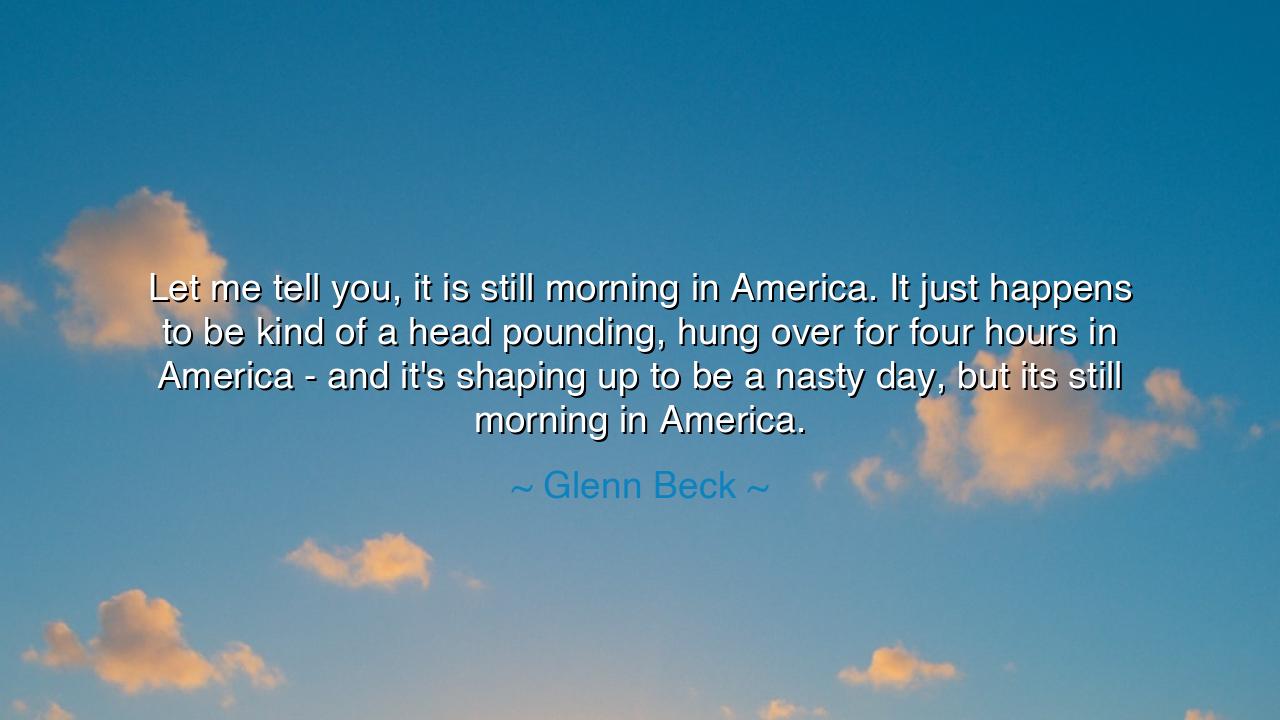
Let me tell you, it is still morning in America. It just happens
Let me tell you, it is still morning in America. It just happens to be kind of a head pounding, hung over for four hours in America - and it's shaping up to be a nasty day, but its still morning in America.






Glenn Beck once spoke with vivid imagery and somber honesty: “Let me tell you, it is still morning in America. It just happens to be kind of a head pounding, hung over for four hours in America – and it’s shaping up to be a nasty day, but it’s still morning in America.” These words, though wrapped in humor and metaphor, carry the weight of both warning and hope. They acknowledge hardship and weariness, yet insist that renewal is still possible, that the dawn has not ended, and that the future is not lost.
The phrase “morning in America” itself carries a great origin. It echoes Ronald Reagan’s famous 1984 campaign, which declared with optimism that a new day had come for the nation — filled with prosperity, pride, and confidence. But Beck, speaking generations later, reshaped the phrase. To him, it was not the fresh, easy dawn of Reagan’s vision, but a weary and painful morning — a morning after turmoil, after indulgence, after mistakes. Yet still, it was morning — and morning always carries the promise of another chance.
The power of the metaphor lies in its honesty. A hangover is the cost of excess, the body’s punishment for overindulgence. Likewise, nations and peoples, after long seasons of waste, division, or corruption, awaken with pounding heads, facing the bitter results of their past choices. Beck reminds us that America, like a man after a long night of recklessness, must face the pain of consequences. Yet he also declares that the day has not been lost — it is only beginning. In hardship lies the possibility of redemption.
History gives us many examples of this rhythm. After the fall of Rome’s Republic, chaos and civil war tore the land apart. Yet from the ruins, Augustus rose and built a new order, flawed yet enduring. After the devastation of the Great Depression, America stumbled, but through resilience, sacrifice, and vision, emerged stronger than before. Each was a painful morning, full of difficulty, but still a morning — a chance to choose differently, to build anew.
Beck’s words also serve as a challenge. It is not enough to recognize that it is morning; one must decide how to use the day. A man may wake with pain, but if he rises, drinks water, steadies himself, and begins again, he can still make his hours fruitful. A nation, too, can either wallow in its mistakes or rise from them with humility and courage. The pain of the morning is a teacher, not a sentence. It urges us to see clearly, to act wisely, and to use the day well.
The deeper lesson is this: despair is never the final truth. No matter how heavy the past, so long as there is morning, there is hope. To say “it’s still morning in America” is to affirm that renewal is possible even in weariness. It is a call to courage, to endurance, to trust that the day, however difficult it begins, can still end in accomplishment and strength.
Practical action flows: accept the reality of hardship without surrendering to it. Do not deny the pain of your mistakes, but neither let them chain you. Rise in the morning, however heavy your head, and begin again with clarity and resolve. For the true strength of a person, or a nation, is not that they never stumble, but that they rise again after stumbling.
Thus Glenn Beck’s words, sharp and unvarnished, shine as a modern proverb. Yes, it may be a hungover, difficult morning; yes, the day ahead may look grim. But it is still morning — still a chance, still a gift, still the beginning of possibility. Children of tomorrow, take this truth to heart: every dawn, no matter how bitter, is a call to renewal. Rise to it, endure it, and shape it into greatness.






AAdministratorAdministrator
Welcome, honored guests. Please leave a comment, we will respond soon